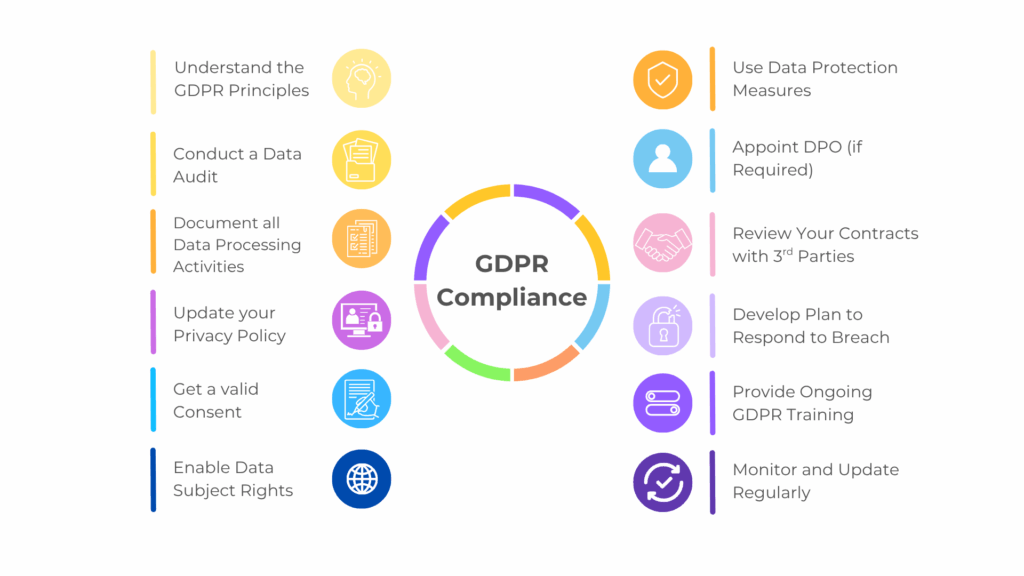The General Data Protection Regulation (GDPR) is one of the most comprehensive privacy laws in the world, setting strict standards for how personal data is collected, stored, and processed.
For international companies, understanding what GDPR stands for, its key requirements, and the consequences of non-compliance is essential. This guide explains the meaning of GDPR, its global application, and the practical steps businesses can take to maintain compliance with GDPR while protecting customer trust.
What is GDPR? (GDPR Meaning)
The GDPR is a comprehensive EU data protection law that sets strict guidelines on how organizations collect, process, store, and share personal data. GDPR intends to give individuals greater control over their personal information while ensuring that businesses are transparent and accountable in their data practices.
What does GDPR stand for?
The full form of GDPR is General Data Protection Regulation.
Does GDPR apply worldwide?
Although it is an EU GDPR regulation, it applies to both EU-based companies and international companies outside the EU if they handle the personal data of EU residents. By setting clear rules, the regulation aims to strengthen GDPR data protection and safeguard privacy rights in today’s digital economy.
What does it mean to be GDPR Compliant?
Compliance with GDPR refers to an organization’s ability to meet all the requirements set out under the EU GDPR for collecting, storing, and processing personal data. Being GDPR compliant means ensuring transparency, security, and accountability in every stage of data handling. This includes obtaining valid user consent where necessary, implementing strong security measures, and responding promptly to data subject requests.
Achieving GDPR compliance is not a one-time task, it requires continuous legal, technical, and organizational efforts to maintain GDPR data protection standards and adapt to evolving privacy risks.
Who Needs to Ensure Compliance with GDPR?
The EU GDPR applies to any organization, regardless of location, that collects or processes the personal data of individuals in the European Union. Its extraterritorial scope means that even businesses outside the EU must follow GDPR compliance rules if they offer goods or services to EU residents or monitor their online activities.
Under the regulation, there are three key roles:
- Data Controllers – Organizations or individuals who determine the purpose and method of processing personal data. They hold primary responsibility for ensuring full compliance with GDPR in all data-handling activities.
- Data Processors – Third parties that process personal data on behalf of a controller. They are also required to be GDPR compliant and must implement robust technical and organisational safeguards.
- Data Subjects – Individuals whose personal information is collected and processed. The GDPR is designed to protect their rights, including access, correction, deletion, and objection to data use.
Importantly, GDPR compliance obligations apply regardless of company size. What matters is not where your business is based, but how you collect, store, and manage personal data.
Key GDPR Compliance Requirements
The EU GDPR sets strict rules to protect individual privacy and promote transparency in how personal data is handled. Failing to meet these GDPR compliance obligations can lead to substantial fines and serious reputational harm.
Below are the core requirements businesses, both in and outside the EU, must follow to remain GDPR compliant.
7 Data Protection Principles
The regulation is based on seven key principles that guide responsible data management:
- Lawfulness, fairness, and transparency – Personal data must be collected legally, and individuals must be informed about its use.
- Purpose limitation – Data can only be used for clearly defined, legitimate purposes.
- Data minimization – Only collect the data necessary to fulfil the stated purpose.
- Accuracy – Keep personal data up to date and correct inaccuracies promptly.
- Storage limitation – Retain data only for as long as needed.
- Integrity and confidentiality – Use strong security measures to prevent breaches or unauthorized access.
- Accountability – Be able to demonstrate compliance with GDPR at all times.
Legal Bases for Processing
Before processing personal data, businesses must establish a lawful basis, such as:
- Consent – Individuals clearly agree to the processing of their data.
- Contractual necessity – Data is required to fulfil a contract.
- Legal obligation – Compliance with laws such as tax or employment regulations.
- Vital interests – Protecting someone’s life in urgent situations.
- Public interest – Performing official or governmental tasks.
- Legitimate interests – Activities like fraud prevention or security, provided they don’t override individual rights.
Data Subject Rights
GDPR grants individuals significant control over their personal data, including the right to:
- Access their information
- Correct inaccuracies
- Request deletion (“right to be forgotten”)
- Restrict or object to processing
- Transfer data to another provider
Organizations must have processes in place to respond promptly to these requests.
Documentation and Accountability
Businesses must maintain detailed records of:
- Data types processed
- Processing purposes
- Data storage locations
- Retention periods
- Security measures in place
Clear documentation supports transparency and helps demonstrate GDPR compliance during audits or investigations.
Data Protection Officer (DPO) Requirement
Organizations that process large-scale or sensitive personal data may be required to appoint a Data Protection Officer. The DPO oversees compliance efforts, advises on policies, and serves as a contact point for both regulators and data subjects. Even when not mandatory, having a DPO can greatly improve data protection governance.
How to Stay Compliant with GDPR
Staying GDPR compliant requires more than a one-time checklist, it’s an ongoing process of monitoring, updating, and improving your data protection practices. Below are key steps to help organizations meet EU GDPR requirements and maintain strong GDPR data protection standards.

Understand the GDPR Principles
Familiarize yourself with the seven core principles of the General Data Protection Regulation, lawfulness, fairness, transparency, purpose limitation, data minimization, accuracy, storage limitation, integrity, confidentiality, and accountability. Aligning business processes with these principles is the foundation of compliance with GDPR.
Conduct a Data Audit
Identify all personal data you collect, process, and store—whether it belongs to customers, employees, or third parties. Record where it is stored, how long it is retained, and who has access to it. This will help you manage risks and identify gaps in compliance.
Document and Record All Data Processing Activities
Clearly define and record how and why personal data is processed, along with its legal basis—such as consent, contractual necessity, or legitimate interest. Documentation is essential for GDPR compliance and demonstrating accountability.
Update Your Privacy Policies
Ensure your privacy policies meet EU GDPR requirements. They should explain the types of data collected, processing purposes, third-party access, retention periods, legal bases, and individuals’ rights. Keep policies clear, accessible, and regularly updated.
Get a Valid Consent
When consent is your legal basis, make sure it is informed, specific, and freely given. Provide clear options for withdrawal and maintain secure records of consent. Avoid bundling consent with unrelated terms.
Enable Data Subject Rights
Put systems in place to fulfil individuals’ GDPR rights, including access, correction, erasure (“right to be forgotten”), restriction, portability, and objection. Respond to requests within the legally required timeframes.
Use Data Protection Measures
Use both technical and organizational safeguards to protect personal data, such as encryption, access controls, regular audits, and breach detection systems. Incorporate privacy by design into new systems and processes.
Appoint a Data Protection Officer (DPO) if Required
Organizations that process large volumes of sensitive data or engage in regular monitoring of individuals must appoint a DPO. This role oversees GDPR compliance, advises on best practices, and acts as a contact for both regulators and data subjects.
Review Your Contracts with Third-Parties
Ensure that contracts with vendors include GDPR-compliant data processing agreements specifying processing purposes, security standards, and retention policies. Regularly verify that third parties also meet GDPR obligations.
Develop a Plan to Respond to Breach
Have a clear process to detect, contain, and report data breaches. Notify relevant authorities within 72 hours, and affected individuals if there’s a high risk to their privacy.
Provide Ongoing GDPR Training
Train staff regularly on GDPR principles, data handling, and breach reporting procedures. A well-informed team reduces compliance risks and strengthens data security.
Monitor and Update Compliance Practices Regularly
Review your data protection processes regularly, track regulatory updates, and adjust your compliance measures accordingly. GDPR compliance is an evolving responsibility, not a one-time project.
GDPR Compliance for Different Business Sizes
Regardless of size, any business that processes the personal data of EU residents must meet GDPR compliance obligations. However, the approach will vary depending on resources, operational scale, and data-handling complexity.
Enterprise Companies
Large enterprises processing high volumes of personal data require a structured and formal approach to compliance with GDPR. This often involves:
- Appointing a Data Protection Officer (DPO)
- Conducting Data Protection Impact Assessments (DPIAs)
- Embedding GDPR compliance into company-wide policies, training, and IT systems
- Managing third-party risk by ensuring all vendors are also GDPR compliant
Given their size, enterprises must maintain robust governance frameworks and ensure accountability across all departments.
Small Businesses
Even small businesses and sole proprietors must comply with the EU GDPR if they handle personal data from EU residents. While they may not always need a DPO, they are still required to:
- Follow GDPR data protection principles
- Obtain valid consent
- Implement reasonable security measures
With limited resources, small businesses can benefit from affordable or automated compliance tools to meet their obligations without overextending their capacity.
Startups
For startups, integrating GDPR data protection from day one is both a legal necessity and a strategic advantage. Privacy should be built directly into products, websites, and customer touchpoints. Key steps include:
- Setting up clear consent management processes
- Securing data storage and transmission
- Embedding privacy-by-design into operations
Early adoption of GDPR compliance best practices helps avoid costly legal risks and strengthens customer trust as the business grows.
Penalties for Non-Compliance with the GDPR
Failing to maintain compliance with GDPR can lead to substantial financial and reputational consequences. The EU GDPR establishes two tiers of fines:
- Lower tier – Up to €10 million, or 2% of the company’s annual global turnover, for first-time or less serious breaches. Examples include inadequate record-keeping or failing to report a data breach within the required timeframe.
- Higher tier – Up to €20 million, or 4% of annual global turnover, for serious or repeated violations, such as unlawful data processing or not obtaining valid consent.
In addition to monetary penalties, regulators can issue formal warnings, restrict or ban data processing activities, and require corrective measures. For both large enterprises and small businesses, prioritizing GDPR compliance is essential to avoid severe financial loss and long-term damage to brand reputation.
In today’s data-driven economy, compliance with GDPR is not only a legal obligation but also a competitive advantage. Businesses that understand the GDPR meaning, respect data subject rights, and adopt strong GDPR data protection measures are better positioned to earn customer confidence and avoid costly penalties.
Whether you operate a multinational enterprise, a small business, or a growing startup, integrating EU GDPR requirements into your operations is an investment in long-term success. By staying proactive and embedding privacy into every process, international companies can meet global expectations for transparency, accountability, and data security.
In addition to protecting personal data, companies operating in the EU are also expected to report transparently on their environmental, social, and governance (ESG) impacts. The Corporate Sustainability Reporting Directive (CSRD) sets out these disclosure requirements, helping businesses align with broader EU sustainability and accountability goals. Read our blog post to learn more about CSRD compliance.


